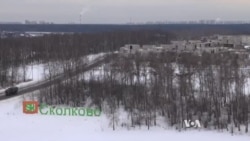For years, Russian economists have been emphasizing the need to diversify Russia's energy export economy to better absorb shocks such as the current drop in world oil prices and Western sanctions. But the calls for diversification have made little headway. One project aimed at fostering innovation and entrepreneurship in Russia is the Skolkovo Institute of Science and Technology (Skoltech), which partners with the Massachusetts Institute of Technology (MIT). However, the economic and political woes helping push Russia into recession are also hampering the project.
Skoltech will see its inaugural class of research students graduate this year, despite not yet having a campus.
When it is completed in coming months, Skoltech hopes to be a beacon for creating global leaders in innovation and new technology.
But the students are facing a Russia heading into recession and with fewer Western investors to support them, said Ilia Dubinsky who heads the Center for Entrepreneurship and Innovation.
“With the recent downturn in relationship between Russia and the rest of the world, it has become more difficult to find these people because they typically flock to where the capital is. And, the capital for risky projects is not very readily available in Russia anymore. So, they are looking outside. And, so they are drifting with their companies where the markets or where the money is,” said Dubinsky.
Dubinsky said several foreign companies that mentor Skoltech students had to stop because their technology business in Russia is now limited.
Dmitry Smirnov invented a fuel-efficient thermal motor, but said finding financial support is not so easy.
“There are not so many funds that are specialized in capital intensive industries in Russia. Most of the funds are, you know, the ownership comes from abroad. And, right now, they are withdrawing their assets from Russia,” said Smirnov.
Kate Kotenko Lengold was able to attract seed money from Russian investors for “ImageAiry,” an online marketplace she developed to sell satellite and aerial imagery. She got the idea while studying overseas at MIT, one of Skoltech's partners.
“I had two degrees back in Russia and it brought me great foundation. But, it was important to apply this knowledge to real life. And, MIT actually taught me how, how to make it,” said Lengold.
The research institute is part of the Skolkovo technology park, initiated by Prime Minister Dmitry Medvedev when he was Russia's president. The Russian government pledged nearly $5 billion dollars to build Skolkovo, but many worry its funding will be cut as authorities focus on propping up state banks and the economy.
However, the government is maintaining support for Skoltech, said Dubinsky, who studied in both Russia and the West and remains optimistic.
“When I returned to Russia, most of the students, even from the best technical universities, wanted to come and work for either administration of the president or large banks or oil companies. Right now if you speak to the same kind of students a full half of them will say that they want to do something in technology and a full third of them will say ‘I want to start my own company.’ So, it is a tremendous change in just a few years,” said Dubinsky.
But the modernization effort is so recent and Russia is so big, Dubinsky added, that even after the economy recovers it will take years, if not decades, to develop a culture of innovation and entrepreneurship.





